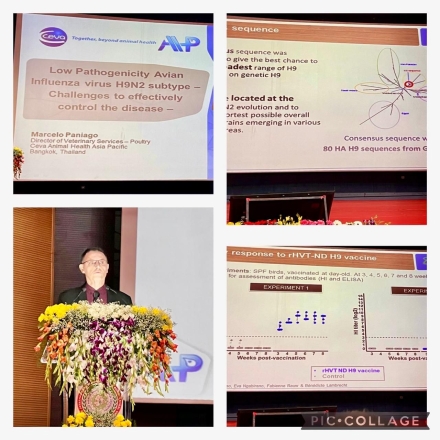Ceva presented on LPAI (H9N2) and introduced Newflend at the 5th biennial Poultry Health Conference in February 2024
The Indian Council of Agricultural Research (ICAR) Directorate of Poultry Research, Hyderabad, in collaboration with the Association of Avian Health Professionals (AAHP), successfully organized the 5th Biennial Poultry Health Conference and National Symposium, held on February 23-24, 2024, the conference focused on the theme “Poultry Health: Current Challenges and Future Strategies.” The primary objective of the conference was to facilitate the exchange of scientific knowledge and interactions between scientists and industry experts in the field of poultry health, welfare, and food safety.
The event witnessed the participation of approximately 300 delegates from various regions of the country. Renowned academicians and researchers from esteemed ICAR institutes, universities, and industries presented insightful lead papers covering pertinent subject areas. These topics included Avian influenza, Newcastle disease, Fowl adenovirus, Marek’s disease, Fowl cholera, Antimicrobial Resistance (AMR), Food Safety, Diagnostics, next-generation sequencing, vaccine quality, hatchery vaccinations, and more.
Dr. Marcelo Paniago, Director of Veterinary Services at Ceva Animal Health Asia Pacific, delivered an insightful presentation on the topic of LPAI H9N2, providing an overview of the current situation and potential strategies for management. His talk emphasized the global prevalence of LPAI, including its presence in India, and highlighted the importance of vaccination as an additional layer of protection against H9N2. Dr. Paniago also discussed the limitations of killed vaccines in providing effective protection against H9N2 and introduced the vector HVT-ND-H9 vaccine (Newflend) as an advanced technological solution. He elaborated on the advantages of this vaccine, such as its extended duration of protection, hatchery administration, lack of interference with maternal derived antibodies, and cross-protection against different lineages of the virus. Dr. Paniago concluded by emphasizing the complementary nature of killed and vector vaccine technologies, in conjunction with stringent biosecurity measures, as the optimal approach to safeguarding birds against the challenges posed by this endemic virus.
A scientific and industry interface meeting was convened to deliberate on poultry health concerns. The meeting was attended by scientists, students, and veterinarians. Dr. Anant G. Wadkar, Country Director for India and South Asia emphasized Ceva’s leadership in hatchery vaccination and underscored its significance in the context of the expanding Indian poultry industry. He stressed the urgent need and actions to dispel rumours about poultry consumption to stabilize the industry’s economy. Other critical issues, such as the importance of “One Health” approach, capitalizing on export opportunities and compartmentalization, were also deliberated upon during the conference.
The conference concluded that the Government of India is providing continuous focus on strengthening the poultry sector. Conference highlighted the current challenges faced in poultry industry and steps to address the challenges effectively.

 POULTRY
POULTRY